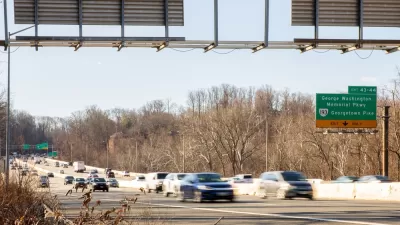A recent article addresses the illogical planning agenda set by states (Missouri, in this case) because local governments (St. Louis, in this case) lack a coherent planning vision. The situation is surely not unique in the annals of planning.

Alex Ihnen starts a recent appraisal of planning in St. Louis with some strong words about the ad hoc method by which planning has been conducted over the last 65+ years. "The City of St. Louis doesn’t have a plan. Well, technically the city does have a comprehensive plan, dating from 1948. That’s not quite fair. Although there has been no new comprehensive plan in 66 years, plenty of planning, zoning overlays, street projects, and more have taken place. There’s even a 260 page encyclopedic sustainability plan that’s spawned an initial 29 priorities across seven categories sufficiently vague and unambitious as to be meaningless. The point is that the city doesn’t have a focused plan to direct urban development. It most surely doesn’t have an operational transportation plan."
Ihnen's argument is that state departments of transportation "are uniquely positioned to thrive in such a vacuum." So in exchange for coherent urban policies, cities like Ihnen's St. Louis instead get "build more roads"—no matter if the city's population is shrinking. "What kind of city do we want, regardless of economic development promises (guesses)? The policies of the past 60 years have failed St. Louis and cities like it. The absence of an urban political lobby, and highly fractured government, has ceded policymaking to highway engineers and their enablers," writes Ihnen.
Ihnen's argument touches on the loss of citizen empowerment, the inability of DOTs to reconsider projections for vehicle miles traveled, and the "ahistoric leaps in logic" required to generate a "build more roads" argument.
Then there's what's lost when the trend is allowed to persist: "When a city defers its self-identity to highway building, you get highways. At some point, residents of the city must understand and speak to their own interests. This type of destructive and wasteful development isn’t any city’s fate, it’s a choice. And if a choice isn’t made, a vision not articulated and fought for? Well, the highway department gets to plan your city."
FULL STORY: When the DOT Plans Your City

Alabama: Trump Terminates Settlements for Black Communities Harmed By Raw Sewage
Trump deemed the landmark civil rights agreement “illegal DEI and environmental justice policy.”

Study: Maui’s Plan to Convert Vacation Rentals to Long-Term Housing Could Cause Nearly $1 Billion Economic Loss
The plan would reduce visitor accommodation by 25% resulting in 1,900 jobs lost.

Why Should We Subsidize Public Transportation?
Many public transit agencies face financial stress due to rising costs, declining fare revenue, and declining subsidies. Transit advocates must provide a strong business case for increasing public transit funding.

Paris Bike Boom Leads to Steep Drop in Air Pollution
The French city’s air quality has improved dramatically in the past 20 years, coinciding with a growth in cycling.

Why Housing Costs More to Build in California Than in Texas
Hard costs like labor and materials combined with ‘soft’ costs such as permitting make building in the San Francisco Bay Area almost three times as costly as in Texas cities.

San Diego County Sees a Rise in Urban Coyotes
San Diego County experiences a rise in urban coyotes, as sightings become prevalent throughout its urban neighbourhoods and surrounding areas.
Urban Design for Planners 1: Software Tools
This six-course series explores essential urban design concepts using open source software and equips planners with the tools they need to participate fully in the urban design process.
Planning for Universal Design
Learn the tools for implementing Universal Design in planning regulations.
Smith Gee Studio
Alamo Area Metropolitan Planning Organization
City of Santa Clarita
Institute for Housing and Urban Development Studies (IHS)
City of Grandview
Harvard GSD Executive Education
Toledo-Lucas County Plan Commissions
Salt Lake City
NYU Wagner Graduate School of Public Service




























